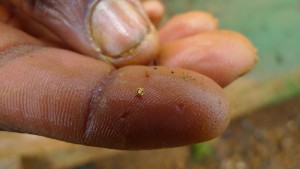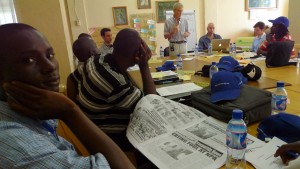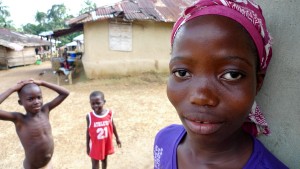Training to investigate West Africa’s mining sector
Three DW-AKADEMIE trainers recently travelled to the Liberian capital, Monrovia, to conduct an investigative reporting workshop on extractive industries. Funded by the German development agency, GIZ, the two-week workshop was attended by 12 print, radio and TV journalists from Sierra Leone and Liberia.
Africa’s vast mineral wealth has often been a curse, feeding graft, ethnic tensions and civil unrest.
In Sierra Leone and Liberia diamonds and gold fuelled brutal civil wars that killed tens of thousands of people and completely destroyed the economies of both countries.
Nearly a decade after the end of these wars, international mining companies are showing huge interest in Liberia and Sierra Leone. Managed wisely, mineral development could offer the two nations a chance to rebuild.
Both countries desperately need the revenue. With average incomes less than US$1 a day, Sierra Leone and Liberia are among the poorest nations in the world, ranking respectively 180 and 182 out of 187 countries in the United Nations Human Development Index.
For mining to be of benefit though, transparency is essential – starting from the bidding process to the awarding of concessions, the signing of contracts and the payment of royalties and taxes. In addition, the social and environmental impacts of exploration and mining activities need to be closely monitored – a vital role for journalists in both countries.
Research and analysis
The workshop started off looking at how investigative journalism, with its emphasis on research and analysis, is different from other types of reporting. This led to a heated discussion of the practical difficulties West African journalists face in accessing information and conducting research.
The trainers then introduced the idea of how reporters can use a working hypothesis to focus their research and structure their investigation.
After several exercises mapping sources and honing research skills, the participants then split up into one radio, one television and two print groups for the practical part of the workshop.
After discussing ideas, the groups decided to produce reports on the following topics:
- Child mining reduces school enrollments
- Firestone rubber company continues to pollute water at Kpanyah town
- Chevron’s off-shore oil findings bring benefits to Liberia
- Liberian mining experts face employment difficulties in the extractive sector
The DW-AKADEMIE trainers accompanied the various groups while they were out in the field gathering material and conducting interviews and were able to provide on-the-spot mentoring.
Two of the groups also made field trips outside of Monrovia to talk to affected communities.
In addition, the workshop participants made a day-long site visit to two small-scale gold mines an hour and a half drive outside of Monrovia. For many of the journalists, it was the first time they had seen such conditions with their own eyes and proved to be the highlight of the workshop.
As the following slideshow shows, travelling outside of the capitals in West Africa is extremely difficult. Dirt roads often become impassable during the monsoon season and often there are no roads at all, requiring long walks (and wet feet) to get into the mines.
Public transport is virtually non-existent and the cost of hiring a four-wheel drive is beyond the budget of most broadcasters. This means journalists have very few opportunities to investigate mining sites and conditions for themselves.
“The issue of transportation and the road network – that is our problem in Liberia. It is very tough and to get from one place to another is not an easy task. I tell you, this is the main impediment to getting news in Liberia.”
Henry Sumo, Power TV
To give the participants greater exposure to some of the issues surrounding the extractive industries, guest speakers were invited to talk to the workshop participants. Peter Kluczny from GIZ gave important background information on the mining sector in West Africa and Liberian Senator, Gbehzonhgar Milton Findlay, talked about the Liberian Extractive Industries Transparency Initiative. The EITI is part of a global project promoting and supporting governance in resource-rich countries.
Making an impact
Journalists are also working together to examine extractive industries. Theo Gbenda was one the participants and is the Chairman of the Association of Journalists on Mining and Extractives in Sierra Leone.
Importantly, the training is beginning to have a positive impact. DW-AKADEMIE Project Manager, Christopher Springate, recently caught up with one of the participants, Aruna Kamara from KISS-FM in Bo, Sierra Leone, and discussed the challenges he faces reporting on extractive industries in his region.
A follow-up workshop is planned during 2012 in Sierra Leone – the same group of journalists will then work on techniques to enable them to ask tougher questions and more thoroughly research their sources.
Author: Kate Hairsine








Feedback